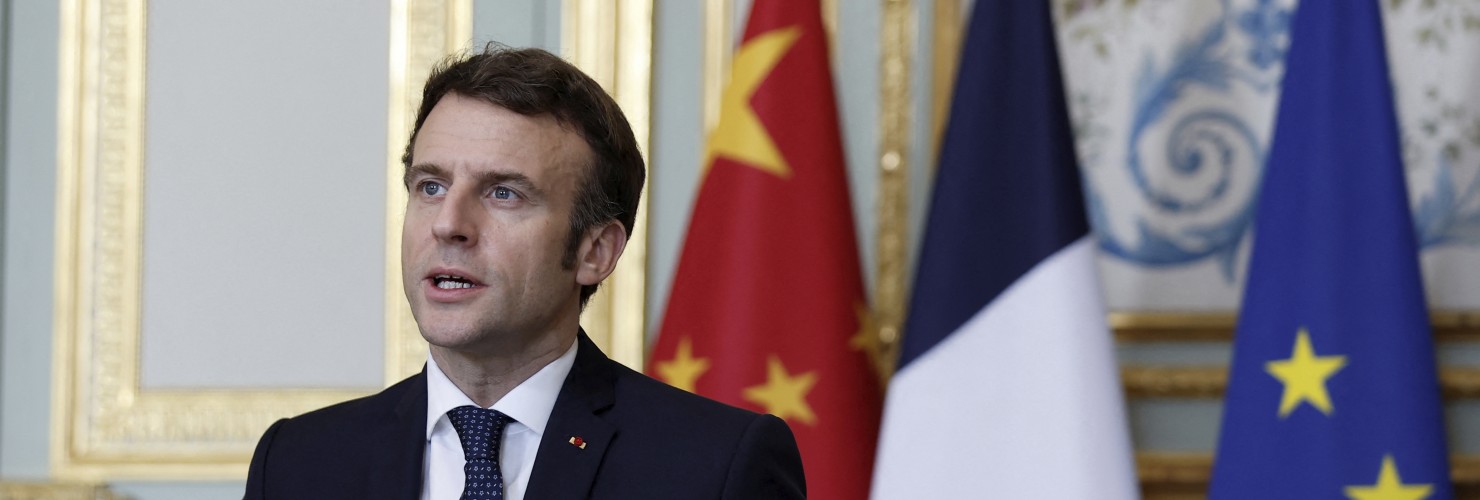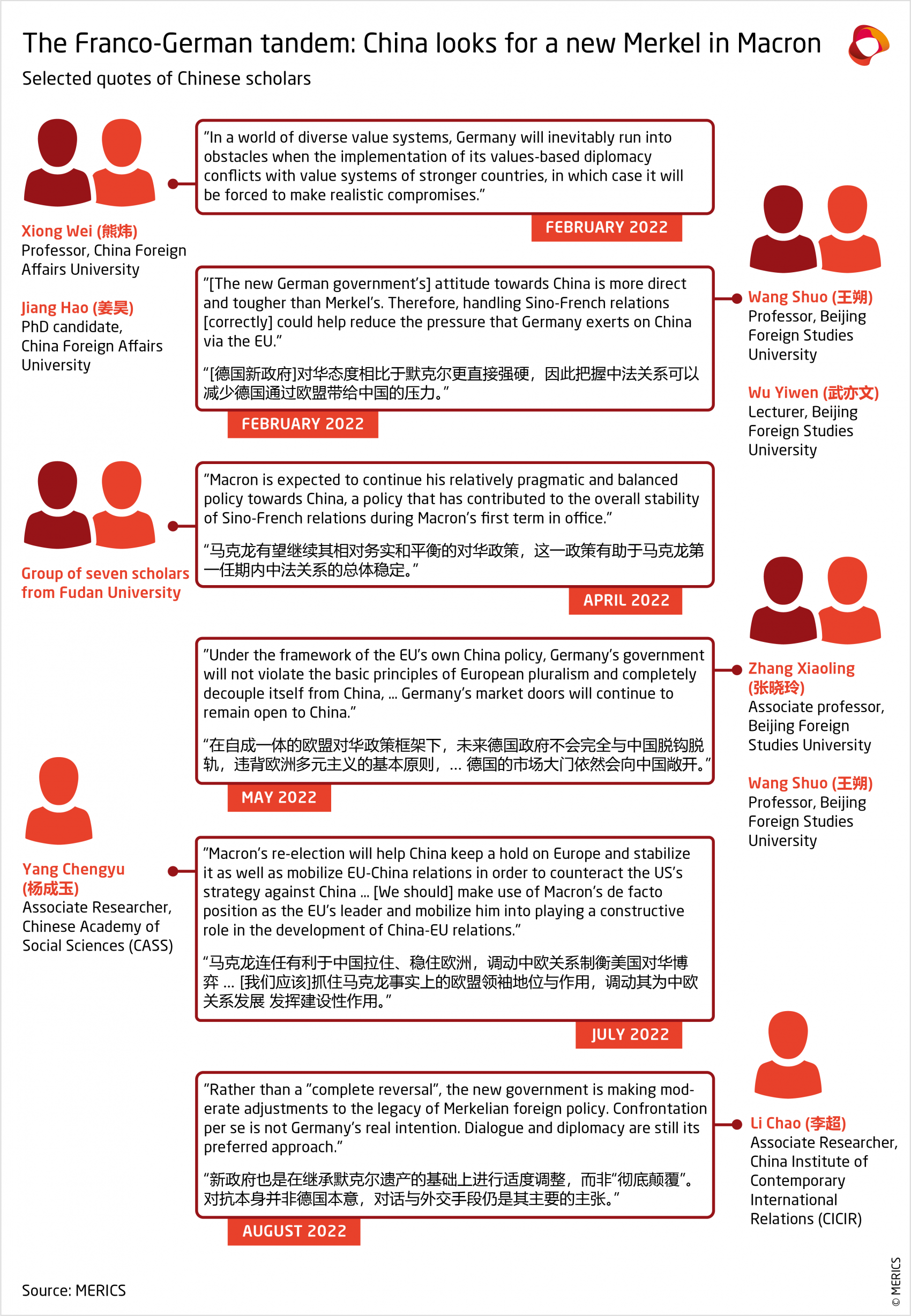

China debates on France and Germany + EU anti-forced labor instrument
CHINA DEBATES
Chinese scholars look for a new Merkel in Macron
By Thomas des Garets Geddes
Germany and France are believed to be preparing back-to-back state visits to China in November – a few weeks after President Xi Jinping is expected to secure a third five-year term in office. Much has changed since German and French heads of state last visited Beijing in 2019. Tensions between European countries and China have risen markedly and the “business as usual” approach to pre-pandemic exchanges is likely to be a thing of the past. In this issue, we provide a short overview of the evolving dynamics of Sino-German and Sino-French relations as perceived by Chinese scholars. Whereas Merkelian Germany was once considered China’s most “pragmatic” (务实) and stable partner in the EU, this is changing. Interest within China is shifting increasingly towards France.
Macron: China’s preferred point of contact
President Emmanuel Macron’s victory over his far-right opponent Marine Le Pen earlier this year was a relief to many international relations experts in China. A commentary by a collective of scholars from Fudan University noted that, “Macron's victory is not only significant for the EU, but also key to the future direction of China-EU relations. Between Macron and Le Pen, Macron was China’s favoured candidate. In the current turmoil that has engulfed Europe and Sino-European relations, Macron can provide the leadership and vision needed to stabilise both the EU and China-EU relations.” Similar views were held by other Chinese analysts both before and after the elections.
As discussed in our April 14 edition, President Macron and French foreign policy in general are seen as presenting several key attributes that are of importance to China: relative predictability, a natural proclivity towards US-skepticism, an increasing sway over EU reforms and a presumed greater emphasis on national interests as opposed to “ideology” relative to other major western countries. France’s approach to China is also described as “two-faced” – an oft-used qualifier in Chinese descriptions of western countries. Yet emphasis tends to be placed on the French government’s desire to engage with, rather than confront, Beijing. Fudan professors Xue Sheng and Zhang Ji hold that “at the EU and multilateral level, France may continue to intensify its criticism of China as a means of demonstrating its ‘political correctness’ [to other western countries]”. However, based on recent interactions, they expect France to continue to encourage cooperation and dialogue in its bilateral exchanges with Beijing.
Chinese scholars increasingly view Macron as China’s key point of contact in its relations with the EU. Unlike German Chancellor Olaf Scholz, who is generally characterized as “weak” and unable to impose his authority over his more China-sceptic coalition partners, Macron’s extensive presidential powers and perceived dominant influence over EU decision-making have evidently raised Chinese interest in strengthening ties with the Elysée. Wang Shuo and Wu Yiwen, two professors at Beijing Foreign Studies University, believe that "Macron is eager to take over the EU's leadership from Germany”, and recommend that “China should therefore ... treat France as the EU's [de facto] leader when cooperating with the EU.”
Germany’s values-based diplomacy is a concern for China
Once considered as the ballast of EU-China relations, Germany post-Merkel has become a source of concern for Chinese scholars. With Germany’s future China policy still in the making, uncertainty pervades Chinese assessments of Berlin’s strategic positioning vis-à-vis both the PRC and the US.
These experts describe German politics as undergoing profound structural changes that are making German foreign policy less predictable and more antagonistic towards China than had previously been anticipated. Driven by younger generations of politicians less burdened by the weight of history, by an increasing emphasis on values over economic interests, and by a realization that soft power alone is not always enough to achieve its objectives abroad, German foreign policy is portrayed as becoming increasingly principled and assertive.
The Bundestag’s vote earlier this year in favor of ending Germany’s so-called "unconditional pacifism” (无条件的和平主义路线) was widely commented upon in the PRC. Chinese scholars described it as a historic step that may well augur yet further changes to German conceptions of national identity and to how Germany interacts with the world. Xiong Wei and Jiang Hao, two researchers from China Foreign Affairs University, acknowledge that while a lot of “common ground” can still be found between both countries, the values and international rules promoted by Germany are often “inconsistent or even conflicting with” those endorsed by Beijing.
Coupled with the growing pressures brought about by the economic competition between both countries, Chinese analysts are predicting a continued worsening of relations with Berlin and fear the impact that this may have on China’s relations with the EU. “In the future, Sino-German relations will become increasingly complex. Germany is set to both gradually strengthen its geopolitical and values-based choice of sides and reduce its [economic] dependence on China”, writes Wu Huiping, deputy director of the Centre for German Studies at Tongji University. Restraint and patience towards Berlin are still being advocated by such observers, but hope is increasingly being placed in a more “pragmatic” France.
Read more:
- Academic article by Xiong Wei and Jiang Hao [EN]: Value-based Diplomacy: The Diplomatic Axis of the New German Government? (Quote 1)
- Academic article by Wang Shuo and Wu Yiwen [CN]: The Opportunities and Challenges for Sino-French Relations (Quote 2)
- Opinion piece by seven Fudan University scholars [CN]: Observing and Analyzing the 2022 French Presidential Elections from a Multidimensional Perspective (Quote 3)
- Academic article by Zhang Xiaoling and Wang Shuo [CN]: A Trial Analysis of Germany's Changing Perception of China (Quote 4)
- Academic article by Yang Chengyu [CN]: France's Future Policy Trends and Prospects for Sino-French Cooperation from the Perspective of the French General Elections (Quote 5)
- Opinion piece by Li Chao [CN]: A 100-day Review of the New German Government's Foreign Policy (Quote 6)
REVIEW
The EU is pushing forward an ambitious anti-forced labor instrument
On September 13, the European Commission presented its legislative proposal on an instrument to ban any good from the single market which involved forced labor in its production process.
What you need to know:
- How would it work? A notification of well-founded suspicions of forced labor on a product on the European market would trigger an investigation by European authorities, including cooperation with the authorities of the suspected regions or countries. When there is a “good likelihood” of such practices at a specific point along the value-chain, the products will be banned from entering the EU single market. Considering the volume of evidence and outcry, further nurtured by a recent bleak United Nation’s assessment, the situation of the Uyghur people and other Muslim ethnic minorities in China, and in Xinjiang in particular, is the key target of the instrument.
- The devil is in the details. A “good likelihood” indicates a rather low burden of proof to ban a product. The exact standard will be clarified once the Commission has published a dedicated due diligence guidance on the risk indicators of forced labor, planned 18 months after the enactment of the legislation, while the actual ban will be effectively applied 24 months after that enactment. Given that independent audits do not take place on the ground in Xinjiang, tight guidance from the Commission could generate a wide scope for potential bans.
- What is at stake? While European imports from Xinjiang only amount to less than 0.2 percent of the imports of PRC origin on the Single Market, the region’s integration along China’s value-chains, especially because of its textile and minerals production, creates the potential for much broader disruptions of European imports from China. Batteries and solar panels, for which China is a significant provider to the EU, are among the key products at risk of disruption for benefiting from forced labor.
- What is next? Now that the Commission has put forth its proposal, the discussion between the Parliament, the Council and the Commission (the trilogue) can start. A final text can be expected to be approved by the Parliament in the first months of 2023, hence no direct disruption is to be expected before 2025 at the earliest.
Quick take: This unexpected project initiated by the head of the European Commission, Ursula von der Leyen, in her State of the Union address of 2022, is materializing sooner rather than later. Indeed, the proposition of the Commission seems to be not so different from the content of the very ambitious proposal of the European Parliament. The hardliner of the matter, French MEP Raphael Glucksmann, signaled his positive assessment of the proposition, indicating that trilogue discussions could be smoother than expected when the bold Parliament recommendations were published in June. In line with its position on trade, the EU instrument would not be discriminative in its formulation in relation to China, contrary to the one recently implemented by the United States. Nevertheless, considering the level of cooperation signaled by the EU and the US on tackling forced labor, recently reemphasized by a joint declaration alongside Japan, the issue could spark wide-ranging disruptions in Sino-European relations.
Read more:
- Politico - European Commission releases forced labor ban proposal
- Mayer Brown - European Commission presents ban on products made with forced labor in the EU market
- The Trilateral (United States, European Union, Japan) – Trilateral Joint Statement on the International Labour Organization’s Global Forced Labour Estimates
- The BBC - China may have committed crimes against humanity in Xinjiang
SHORT TAKES
China’s Special Representative targets specific EU capitals: Chinese MFA’s Special Representative for European Affairs, Wu Hongbo, is doing the rounds with meetings across the EU to Spain, Portugal, Belgium, and EU institutions. His trip coincides with that of his newly appointed counterpart for relations with Central and Eastern Europe, Jiang Yu, who is visiting six CEE countries.
- Ministry of Foreign Affairs of the People’s Republic of China: Special Representative Wu Hongbo of the Chinese Government on European Affairs Visits EU Headquarters
- EUObserver: EU must beware Beijing's new charm offensive
- MERICS: Jiang Yu — China’s new Special Representative for Central and Eastern European Countries
EUCCC criticizes ideologization of China’s business environment: In its annual position paper, the European Union Chamber of Commerce in China (EUCCC) pointed to business disruptions created by “inflexible COVID-19 policy”, politicization of business and self-sufficiency minded favoritism of state-owned companies as the key challenges faced by European companies in China. Largely for those reasons, smaller companies are limiting their investments in China leaving only big players committed to the country. But those also are increasingly concerned by the growing need to navigate between conflicting Chinese, and European and American supply-chain regulations.
EU imports from Xinjiang surge: Direct shipments from the region of Xinjiang to the EU27 increased by over 130 percent year on year in August prior to the release of the UN Xinjiang report and of the proposal of the anti-forced labor instrument by the European Commission. The surge, driven by a spike in imports of lithium and polysilicon — used in solar panels amid the energy crisis, highlights the challenge of facilitating a green transition amid a dependency on Chinese raw materials that are allegedly entangled with forced labor practices.
Jorge Toledo begins his tenure as EU Ambassador to China: A diplomat with a career rooted within the Spanish foreign policy apparatus, Jorge Toledo Albiñana, presented his credentials to Chinese authorities on September 20. See his profile, which we covered in a previous brief.
China criticizes EU climate policies: Xie Zhenhua, China’s climate envoy, raised concerns over EU member states’ temporary increase of coal usage in his exchange with German counterpart Jennifer Morgan. In the conversation, a precursor to the November COP27 conference, Xie also highlighted that China would hope to see more "positive action" on climate from the EU and other developed countries. The publication released by the Chinese Ministry of Environment may be a signal towards developing countries as Beijing seeks to position itself as their advocate.




